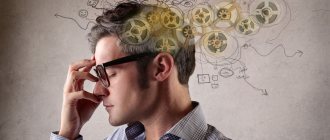What are cognitive processes?
Every day the human brain has to process a huge amount of information, in which mental processes help it.
Thanks to cognition, we have the ability to understand the world around us.
Find out what awaits you today - Horoscope for today for all zodiac signs
Due to numerous requests from subscribers, we have prepared an accurate horoscope application for mobile phones. Forecasts will arrive for your zodiac sign every morning - it's impossible to miss! Download for free: Daily Horoscope 2020 (available on Android)
Let's look at a specific example. You are sitting and watching a movie, enthusiastically delving into the essence of what is happening, when suddenly you hear a strange sound from the street, like an explosion. Will you continue watching TV as if nothing had happened, or will you run to the window to see what happened? Naturally, the second option.
Your brain will instantly switch to new information in order to find out if it poses any threat to you. Cognitive processes are responsible for this.
Thanks to harmonious mental processes, a person is able to adequately assess what is happening, reacting correctly to it. This allows you to correctly adapt to different situations.
The mental process can be either joint or occur independently.
Who studies cognitive processes? Linguists, sociologists, neurologists, anthropologists and philosophers. Psychology has a separate branch for the study of these processes, called cognitive psychology.
Varieties
Now let's figure out what mental processes are.
Basic (lower) cognitive processes
They are presented:
Feeling and perception
We are constantly exposed to various stimuli and signals that make us feel something. Feelings serve as an additional tool for understanding the surrounding reality. Moreover, they can come both from outside and from the depths of ourselves.
Gestalt psychologists, who are engaged in a detailed study of human perception of the world, made a great contribution here. They came up with the laws of Gestalt, which explain the perception of what is happening through optical illusions.
Attention
We live in a world of information and receive many signals and stimuli every day, while paying attention to what we are most interested in.
For a number of activities, such as walking or chewing, we do not need attention. But we will need greater concentration on what we say and how we present it, if, for example, we have to speak in public.
The positive thing is that when certain processes are repeated systematically, they become automatic. For example, if at first it’s difficult for us to drive a car, then later the skills are improved and performed “automatically,” thanks to which much less energy is wasted.
By memory
Our memory stores answers to countless questions that arise in life. It is thanks to it that we encrypt information received from outside and store it so that it can be restored when necessary.
Memory can be of different types: sensory, short-term, working, autobiographical, and so on. All of the varieties interact with each other, but they all originate in different parts of the brain.
Higher (complex cognitive processes)
They are presented:
Mind (intellect)
Intelligence is a set of abilities that help in solving various problems. Nowadays, the most popular theory is about multiple intelligences, which was proposed by Gardner. According to it, there is no one type of mind, and in different situations a person uses different abilities, starting from what is happening.
Smart people have a number of specific identifying characteristics. But intelligence can be improved; there are several methods for this.
Thinking
Human thoughts are incredibly complex and diverse. Thanks to thinking, we can solve various difficulties, reason, make decisions, think creatively, logically, and so on.
To simplify these processes, thoughts with judgments are created in our brain. Our task is to group ideas, objects, people, etc., which has an accelerating effect on mental processes.
But in the desire to achieve logic, a person often forgets about his irrationality. Just think - to speed up thinking we use shortcuts, but in the end we don’t analyze all the information! As a result, cognitive biases and deviations from the norm arise.
Due to cognitive biases, cognitive distortions, negative and irrational thoughts develop, which cause a lot of suffering. For example, “nobody loves me”, “I will always be lonely” and so on.
Fortunately, a person has power over his own thoughts, but not everyone is aware of it and not everyone knows how to use it correctly.
Speech
The human brain reproduces and understands different words, sounds, and combines an innumerable number of letters with sentences to express our thoughts and emotions. Some people speak several languages at the same time (polyglots).
Speech develops and improves throughout life. Although we are all born with different communication skills, they can improve with practice. The latter is especially important for people with speech disorders, because they can also be, if not completely eliminated, then at least reduced.
Cognitive behavioral psychotherapy
cognitive approach in psychology
Today, with the help of cognitive behavioral psychotherapy, therapists work with people’s mental disorders: eliminate them, smooth them out, or reduce the likelihood of future relapses. It helps eliminate psychosocial consequences, correct behavior, and increase the effectiveness of medication treatment. This direction was based on the ideas of George Kelly.
Kelly's personality construct theory states that each mental process proceeds through different ways of predicting events in the surrounding reality. Human consciousness and behavior are not controlled by instincts, incentives, or even the need for self-actualization. He acts as a scientist, studying and understanding the world around him and himself.
According to Kelly, a person, by studying the behavior of others, trying to understand its essence and make predictions, builds his own system of personal constructs. The concept of “construct” is fundamental in the scientist’s theory. The construct consists of the characteristics of perception, memory, thinking and speech and is a classifier of how a person perceives himself and the world around him.
This is the main means for classifying the phenomena of reality, which is a bipolar scale, for example, “stupid-smart”, “beautiful-ugly”, “brave-cowardly”, etc. The process of a person’s choice of constructs characterizes him as an object of cognition, which is the subject of interest of all therapy. The constructs form a system, and if it turns out to be ineffective, a healthy person either changes it or replaces it with a new one. In case of mental disorders, they resort to therapy.
In general terms, therapy can be defined as a comparative analysis of the characteristics of people’s perception and interpretation of external information. This analysis consists of three stages:
- At the first stage, the patient works with various tools that help identify erroneous judgments and then find their causes.
- At the second stage, the patient, with the help of a therapist, masters techniques for correct correlations between phenomena in the surrounding world. The specialist’s task is to show a person the benefits and harms, advantages and disadvantages of an existing construct.
- At the third stage, the patient must become aware of the new construct and begin to build his behavior on its basis.
It is important to note that the specialist only starts the treatment process, and then simply corrects it. And a lot here (which is also typical in other areas of psychiatry and psychology) depends on the person undergoing treatment.
Kelly's theory describes a conceptual framework that allows a person to make sense of reality and create specific behavioral patterns. By the way, it was supported by the famous Canadian and American psychologist Albert Bandura. He developed a system of "observational learning" used to change behavior.
The personal construct itself is used by world experts who study the causes of low self-esteem, fears and phobias, and depressive states. Cognitive psychotherapists believe that the cause of any mental disorder lies in dysfunctional (wrong) constructs. This is why Kelly's theory is so important for therapy.
Application of cognitive processes in education
Psychologists analyze mental processes to improve a person's quality of life. It is important for each of us to improve ourselves and control ourselves in order to achieve certain results. How do cognitive processes help with this?
In training
There are many learning theories that differ from each other. But all of them (with the exception of associative learning theory) use cognitive processes.
Moreover, when we learn, all cognitive processes are interconnected. It takes effort, using all resources to improve your study skills and learn something more effectively.
When reading
For high-quality reading, it is important to be able to quickly recognize letters, concentrate on a book, remember information, relate it to what was already known, and so on.
At the same time, the process of processing information will vary depending on the goal: learning a hobby, preparing for an exam, or simply reading a fascinating story.
When writing
The situation is similar to the cognitive processes that occur when reading. It is important to protect yourself from unnecessary noise, try to write legibly, not lose your thoughts, control spelling, etc. Planning what we write about is also important.
Drink wine
Norwegian scientists have found that people who regularly drink wine perform better on cognitive tasks than those who give up alcohol. This connection is especially pronounced among women. Of course, wine can only help if its quantity is strictly limited. It is assumed that the features of this drink are based on the antioxidant properties of wine.
Coffee
Improvement of cognitive processes
The positive thing is that mental processes can be improved, and at any age. Use the following tips to improve your brain.
Watch your health
The way we feel physically and think is closely influenced by cognitive processes. Certain addictions have an extremely negative impact on mental health and contribute to a decrease in labor productivity.
This may include an unhealthy addiction to a mobile phone, being stuck on the Instagram news feed, refusal of a healthy daily routine, unhealthy diet and many other factors.
Use technological progress to your advantage
Fortunately, there are now plenty of different ways to improve intelligence: intellectual games, for example. Thanks to neuroeducation, we begin to better understand what is happening in our brains.
I would like to mention the CogniFit Internet platform. On her website you will find many psychological tests, exercises, and games that allow you to accurately measure and stimulate your cognitive abilities.
Celebrating victories
It is important not only to improve yourself, but also to regularly express praise to yourself for the work done. Record your small and big successes every day, be sure to express gratitude to yourself for them and continue to develop.
Engage in developing critical thinking
Critical thinking is an essential component of every adult and competent person. Thanks to it, we get the opportunity to improve our ability to think, make connections between thoughts, improve speech skills, perform a deep analysis of what is happening, and so on.
To reach your full potential, it is important to be curious enough.
It is very easy to develop critical thinking as a child. To do this, you need to ask the child a question why the person acted this way and not otherwise, and offer to enter into an argument with the child with a different position.
As an adult, it is also important to develop critical thinking; for this, you should always analyze information coming from outside for realism.
Read
It has already been said before that reading engages mental processes in full. And when we read something interesting, we get real pleasure, plus we learn new information and expand our horizons. Reading has a positive effect on problem solving and improving communication skills.
Get creative
Drawing, creating stories, inventing melodies, writing poetry, photography... It is vital for a person to have some kind of creative activity “for the soul.” And each of us has creative inclinations, it’s just that not everyone is engaged in their manifestation.
How is creativity useful? It develops cognitive processes, has a positive effect on the intellect, improves concentration, helps to find innovative methods for solving problems, relaxes and causes the brain to produce the hormone of pleasure and happiness - endorphin!
Internal control system
"Control system" - acts in unity with the action system to facilitate, regulate, change or suppress impulses and actions. Control functions can be divided into those related to self-regulation, that is, directed inward, and those that are responsible for relations with the external, primarily social, environment.
Under normal conditions, this self-management system operates more or less automatically. People may not be aware of these “self-cues” unless they specifically focus on them. These cognitive structures can then be represented in the form of so-called “automatic thoughts” or internal communication. This system is based on beliefs (self-concepts, rules and inhibitions), many or most of which are realistic or adaptive.
Control is carried out using internal communication, which consists of self-monitoring (self-report, self-observation), self-evaluation, warnings, self-instructions (commands), promises of certain reinforcement or punishment given to oneself.
Self-monitoring
Self-monitoring is observing yourself and your own behavior. Self-report may be influenced by rules. Thus, a woman who adheres to the rule “I must always do my job perfectly” is likely to constantly monitor her work.
Evaluating yourself
Self-evaluation involves expressing value judgments about oneself in the concepts of “good - bad”, “worthwhile - worthless”, “attractive - unattractive”. A person praises himself for achieving a certain goal (self-praise) and criticizes himself for not achieving the required level of quality. Negative self-evaluations are clearly found in depression, but can be more subtle in most other disorders. Self-evaluations appear to derive from deeper structures, namely self-concepts, or self-schemas. In fact, exaggerated negative (or positive) self-concepts may be factors that move a person from the “personality type” group to the “personality disorder” group. For example, developing a strong view of oneself as helpless may cause a person who experienced normal addiction-related desires in childhood to develop a “pathological” addiction in adulthood. Rules also influence self-evaluation. Having the rule “I must always do the job perfectly,” a woman will evaluate herself negatively if she makes even a small mistake.
Self-report and self-evaluation are important methods by which people can determine whether they are “on track.”
Commands or self-instructions
Commands or self-instructions are based on beliefs such as rules (“shoulds”) and prohibitions (“don’ts”). As we grow up, we create a lot of rules and prohibitions. They set standards, shape expectations and our plans of action. Inhibitions prevent the expression of desires. Here are examples of the rule “You must rely on authority”, examples of prohibitions: “You cannot hit someone who is weaker or stronger than you”, “You must not cry in public.” These beliefs are automatically transformed into commands: “Don’t hit,” “Do what you’re told,” “Don’t cry.”
Self-control
Self-control can be achieved through reinforcement or punishment. Material reinforcements and reinforcement with certain activities can be used. One type of self-reinforcement is self-praise. Elimination of positive reinforcers can be used as self-punishment, and physical punishment can also be used.
The control or regulatory system plays a crucial role in various disorders. Self-directed regulatory processes become more prominent when they are excessive or deficient. People who are overly self-controlled tend to feel depressed (we see this in avoidant personalities and also with anxiety), while a lack of inhibition contributes to impulsivity.
Literature on cognitive behavioral psychotherapy.
Introduction to Cognitive Psychotherapy by Aaron Beck.










